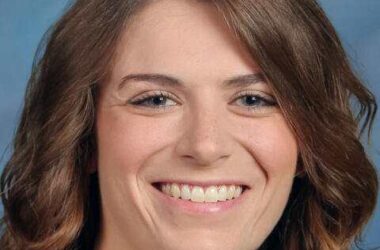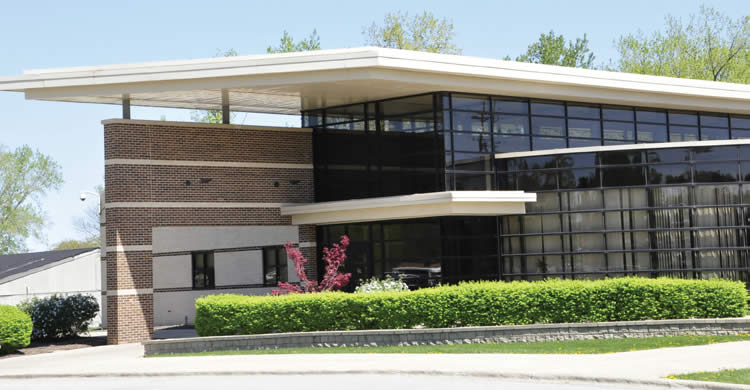Registered nurses to obtain B.S., M.S. and specialized certificate in one flexible online program

DePaul University School of Nursing launches new RN to MS in Nursing program, giving nurses the opportunity to advance their careers with a specialized online degree program. (Photo by Flip Chalfant)
CHICAGO—(ENEWSPF)—August 20, 2014. Registered nurses with an associate’s degree in nursing will have the opportunity to advance their careers with a new specialized online degree program from DePaul University. The “RN to MS in Nursing” program, with classes beginning in January, offers a path for registered nurses to earn a Bachelor of Science degree and Master of Science degree from DePaul, as well as a graduate certificate from Rosalind Franklin University of Medicine and Science in the areas of health administration or health professions education.
“There is a recognized national need for registered nurses to be educated at higher levels in order to provide care within hospitals, clinics, providers’ offices and other venues,” said William Cody, director of the DePaul University School of Nursing. “Research strongly supports that lives are saved by every additional nurse with a higher academic degree.”
Designed as a two-to-three year program for those who want to become nurse educators or nurse administrators, the RN to MS in Nursing program allows nurses to obtain their degrees and certificate in a flexible online format that can be completed while continuing to work full time.
Admission into the program offered by the School of Nursing in DePaul’s College of Science and Health requires prospective students to be licensed registered nurses and have an associate’s degree in nursing.
“The certificate from Rosalind Franklin University of Medicine and Science is unique,” Cody said. “It means that the graduate has gained, in approximately three years, a total of two degrees and a graduate certificate to advance his or her career.”
Students choosing the health care education path will be trained in clinical content, health care systems, and innovative online and computer simulation modalities, in addition to traditional classroom teaching. Those choosing to go into health care management will be trained to become experts in evaluating evidence-based outcomes and translational research, which puts findings into practice to ensure safe, quality care. They also will learn the effective use of technology and cross-cultural communication.
“DePaul’s RN to MS in Nursing program is an excellent example of how our two universities are bringing the power of collaboration to bear on the nation’s pressing health care challenges,” said Jim Carlson, dean of the College of Health Professions at Rosalind Franklin University of Medicine and Science. “We’re working together to help today’s health care workforce meet the increasingly complex demands of patient care. Gaining graduate-level competency in health administration or health professions education will help nurses advance in their careers and meet the challenges of their profession with confidence.”
Six courses in the overall program count toward both the Bachelor of Science and Master of Science in nursing degrees. The bachelor’s degree in nursing allows for career progression even before the master’s degree is completed.
A key feature of the RN to MS in Nursing program is the bachelor’s degree stop-out option. If students need to leave the program prior to earning their master’s degree, they can still earn a bachelor’s degree. This is an advantage that many other RN to MS in Nursing programs do not offer. Obtaining a degree at the bachelor’s level provides registered nurses with career mobility options. They are able to apply for positions in acute care settings and magnet hospitals, an option that is not available to registered nurses and those with associate degrees in nursing.
“The program is designed to be academically challenging and provide extensive learning experiences that are truly transformative for the student,” Cody said. “The preparation we offer is broad and deep, thorough and thoughtful, and the degrees awarded will represent substantial intellectual achievement.”
The Institute of Medicine, an independent nonprofit health arm of the National Academy of Sciences, has called for 80 percent of registered nurses to be educated at a bachelor’s degree level or higher by 2020. This industry recommendation will mean the transformation of over one million registered nurses in the nation’s nursing workforce. Nurse educators are now challenged to create innovative pathways for seamless, accelerated and streamlined education to help associate-degree nurses become highly skilled nurse leaders.
For 65 years, the DePaul University School of Nursing has provided an education that is innovative and pragmatic; giving graduates a head start in achieving professional success. In recent years, DePaul has expanded its education programs in the sciences, establishing the College of Science and Health and building two high-tech facilities designed specifically for science instruction. This fall, the School of Nursing will have over 400 students enrolled, a 20-year high for the school.
The DePaul-Rosalind Franklin Alliance for Health Sciences was formed in October 2012 and is designed to establish curricular pathways for DePaul students to graduate from professional degree programs at Rosalind Franklin while expanding and strengthening academic programs at both schools. It also fosters collaboration between the faculties of the two institutions and creates additional research opportunities for students.
For more information about DePaul’s School of Nursing and the new RN to MS in Nursing program, visit http://bit.ly/1oatbZY.
Source: www.depaul.edu








